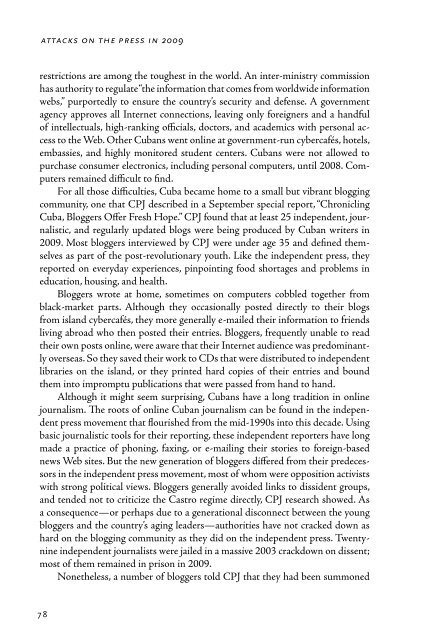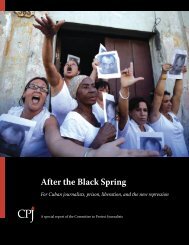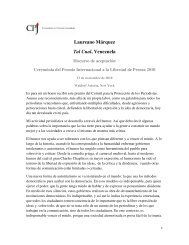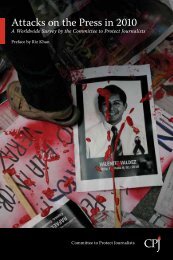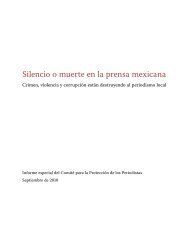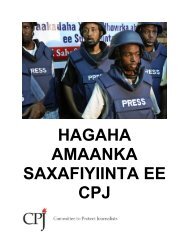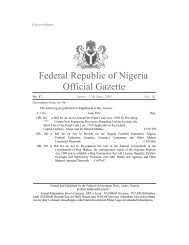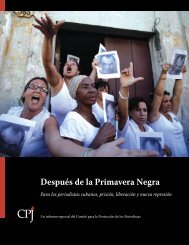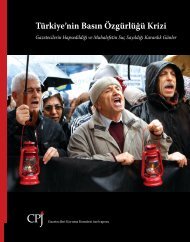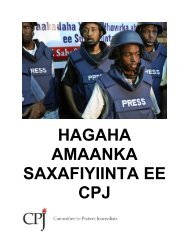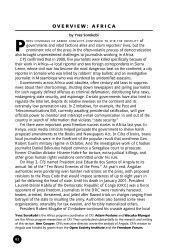Attacks on the Press - Committee to Protect Journalists
Attacks on the Press - Committee to Protect Journalists
Attacks on the Press - Committee to Protect Journalists
- No tags were found...
Create successful ePaper yourself
Turn your PDF publications into a flip-book with our unique Google optimized e-Paper software.
attacks <strong>on</strong> <strong>the</strong> press in 2009americas: cubarestricti<strong>on</strong>s are am<strong>on</strong>g <strong>the</strong> <strong>to</strong>ughest in <strong>the</strong> world. An inter-ministry commissi<strong>on</strong>has authority <strong>to</strong> regulate “<strong>the</strong> informati<strong>on</strong> that comes from worldwide informati<strong>on</strong>webs,” purportedly <strong>to</strong> ensure <strong>the</strong> country’s security and defense. A governmentagency approves all Internet c<strong>on</strong>necti<strong>on</strong>s, leaving <strong>on</strong>ly foreigners and a handfulof intellectuals, high-ranking officials, doc<strong>to</strong>rs, and academics with pers<strong>on</strong>al access<strong>to</strong> <strong>the</strong> Web. O<strong>the</strong>r Cubans went <strong>on</strong>line at government-run cybercafés, hotels,embassies, and highly m<strong>on</strong>i<strong>to</strong>red student centers. Cubans were not allowed <strong>to</strong>purchase c<strong>on</strong>sumer electr<strong>on</strong>ics, including pers<strong>on</strong>al computers, until 2008. Computersremained difficult <strong>to</strong> find.For all those difficulties, Cuba became home <strong>to</strong> a small but vibrant bloggingcommunity, <strong>on</strong>e that CPJ described in a September special report, “Chr<strong>on</strong>iclingCuba, Bloggers Offer Fresh Hope.” CPJ found that at least 25 independent, journalistic,and regularly updated blogs were being produced by Cuban writers in2009. Most bloggers interviewed by CPJ were under age 35 and defined <strong>the</strong>mselvesas part of <strong>the</strong> post-revoluti<strong>on</strong>ary youth. Like <strong>the</strong> independent press, <strong>the</strong>yreported <strong>on</strong> everyday experiences, pinpointing food shortages and problems ineducati<strong>on</strong>, housing, and health.Bloggers wrote at home, sometimes <strong>on</strong> computers cobbled <strong>to</strong>ge<strong>the</strong>r fromblack-market parts. Although <strong>the</strong>y occasi<strong>on</strong>ally posted directly <strong>to</strong> <strong>the</strong>ir blogsfrom island cybercafés, <strong>the</strong>y more generally e-mailed <strong>the</strong>ir informati<strong>on</strong> <strong>to</strong> friendsliving abroad who <strong>the</strong>n posted <strong>the</strong>ir entries. Bloggers, frequently unable <strong>to</strong> read<strong>the</strong>ir own posts <strong>on</strong>line, were aware that <strong>the</strong>ir Internet audience was predominantlyoverseas. So <strong>the</strong>y saved <strong>the</strong>ir work <strong>to</strong> CDs that were distributed <strong>to</strong> independentlibraries <strong>on</strong> <strong>the</strong> island, or <strong>the</strong>y printed hard copies of <strong>the</strong>ir entries and bound<strong>the</strong>m in<strong>to</strong> impromptu publicati<strong>on</strong>s that were passed from hand <strong>to</strong> hand.Although it might seem surprising, Cubans have a l<strong>on</strong>g traditi<strong>on</strong> in <strong>on</strong>linejournalism. The roots of <strong>on</strong>line Cuban journalism can be found in <strong>the</strong> independentpress movement that flourished from <strong>the</strong> mid-1990s in<strong>to</strong> this decade. Usingbasic journalistic <strong>to</strong>ols for <strong>the</strong>ir reporting, <strong>the</strong>se independent reporters have l<strong>on</strong>gmade a practice of ph<strong>on</strong>ing, faxing, or e-mailing <strong>the</strong>ir s<strong>to</strong>ries <strong>to</strong> foreign-basednews Web sites. But <strong>the</strong> new generati<strong>on</strong> of bloggers differed from <strong>the</strong>ir predecessorsin <strong>the</strong> independent press movement, most of whom were oppositi<strong>on</strong> activistswith str<strong>on</strong>g political views. Bloggers generally avoided links <strong>to</strong> dissident groups,and tended not <strong>to</strong> criticize <strong>the</strong> Castro regime directly, CPJ research showed. Asa c<strong>on</strong>sequence—or perhaps due <strong>to</strong> a generati<strong>on</strong>al disc<strong>on</strong>nect between <strong>the</strong> youngbloggers and <strong>the</strong> country’s aging leaders—authorities have not cracked down ashard <strong>on</strong> <strong>the</strong> blogging community as <strong>the</strong>y did <strong>on</strong> <strong>the</strong> independent press. Twentynineindependent journalists were jailed in a massive 2003 crackdown <strong>on</strong> dissent;most of <strong>the</strong>m remained in pris<strong>on</strong> in 2009.N<strong>on</strong>e<strong>the</strong>less, a number of bloggers <strong>to</strong>ld CPJ that <strong>the</strong>y had been summ<strong>on</strong>edby authorities for questi<strong>on</strong>ing and threatened with sancti<strong>on</strong>s, including impris<strong>on</strong>ment,if <strong>the</strong>y did not s<strong>to</strong>p writing. In November, state security agents detained,assaulted, and harassed Yoani Sánchez, an internati<strong>on</strong>ally recognized blogger, andtwo fellow bloggers, Claudia Cadelo and Omar Luís Pardo Lazo. Authorities alsorevoked Sánchez’s permissi<strong>on</strong> <strong>to</strong> travel outside <strong>the</strong> country.Bloggers and independent journalists filing <strong>to</strong> overseas news outlets c<strong>on</strong>tinued<strong>to</strong> cover issues that were ignored by <strong>the</strong> official media. As some of Cuba’smost powerful officials and well-known Fidel Castro loyalists—including ForeignMinister Felipe Pérez Roque and Vice President Carlos Lage—were removedfrom office in March, <strong>the</strong> news was briefly reported at <strong>the</strong> end of an official TVnewscast. A day later, <strong>the</strong> official dailies, <strong>the</strong> <strong>on</strong>ly <strong>on</strong>es available in Cuba, printed<strong>the</strong> resignati<strong>on</strong> letters without comment or c<strong>on</strong>text. Bloggers questi<strong>on</strong>ed <strong>the</strong>reas<strong>on</strong>s behind <strong>the</strong> decisi<strong>on</strong> and <strong>the</strong> repercussi<strong>on</strong>s <strong>the</strong>se changes would have <strong>on</strong><strong>the</strong> island. Independent writers such as Elizardo Sánchez Santa Cruz, presiden<strong>to</strong>f <strong>the</strong> Cuban Commissi<strong>on</strong> <strong>on</strong> Human Rights and Nati<strong>on</strong>al Rec<strong>on</strong>ciliati<strong>on</strong>, andOscar Espinosa Chepe, a formerly impris<strong>on</strong>ed journalist, discussed <strong>the</strong> developmentsin opini<strong>on</strong> pieces.In July, President Raúl Castro spoke about <strong>the</strong> severe impact of <strong>the</strong> globalfiscal crisis <strong>on</strong> <strong>the</strong> island, and announced spending cuts <strong>to</strong> revitalize <strong>the</strong> ec<strong>on</strong>omy.The island’s official press resp<strong>on</strong>ded with superficial edi<strong>to</strong>rials calling <strong>on</strong> Cubans<strong>to</strong> “save” and “be understanding.” Bloggers and independent journalists reported<strong>on</strong> citizens’ varied resp<strong>on</strong>ses. Many s<strong>to</strong>ries, CPJ found, were critical of <strong>the</strong> regime’spolicies and <strong>the</strong> possible repercussi<strong>on</strong>s <strong>on</strong> daily life.Bloggers developed str<strong>on</strong>g global c<strong>on</strong>necti<strong>on</strong>s and created new means of gettinginformati<strong>on</strong> out of Cuba, allowing <strong>the</strong>m <strong>to</strong> highlight problems that wouldo<strong>the</strong>rwise go unreported locally and internati<strong>on</strong>ally, CPJ research found. Internati<strong>on</strong>aloutlets sought out <strong>the</strong>ir opini<strong>on</strong> and, at times, published <strong>the</strong>ir work. InSeptember, <strong>the</strong> blogging community hit ano<strong>the</strong>r milest<strong>on</strong>e. An associati<strong>on</strong> of Cubanbloggers sent Twitter messages for <strong>the</strong> first time from <strong>the</strong> island announcing<strong>the</strong> winners of <strong>the</strong> first local blogging c<strong>on</strong>test, according <strong>to</strong> a report in The MiamiHerald. This kind of internati<strong>on</strong>al attenti<strong>on</strong> could provide bloggers (and independentreporters) with some protecti<strong>on</strong> from harassment and impris<strong>on</strong>ment.In April, U.S. President Barack Obama lifted restricti<strong>on</strong>s <strong>on</strong> visits and <strong>the</strong>sending of m<strong>on</strong>ey <strong>to</strong> Cuba by Americans with family <strong>on</strong> <strong>the</strong> island, but he ruledout terminati<strong>on</strong> of <strong>the</strong> decades-l<strong>on</strong>g U.S. embargo. Obama said his administrati<strong>on</strong>was willing <strong>to</strong> talk <strong>to</strong> Castro’s government, and he urged Cuba <strong>to</strong> reciprocatewith human rights improvements, The Associated <strong>Press</strong> reported. Secretary ofState Hillary Rodham Clint<strong>on</strong> said Cuba should “open up <strong>to</strong> outside opini<strong>on</strong>sand media.” President Castro resp<strong>on</strong>ded swiftly, stating that Cuba was willing<strong>to</strong> discuss <strong>the</strong> issues but calling as well for <strong>the</strong> release of five Cubans impris<strong>on</strong>ed7 87 9


